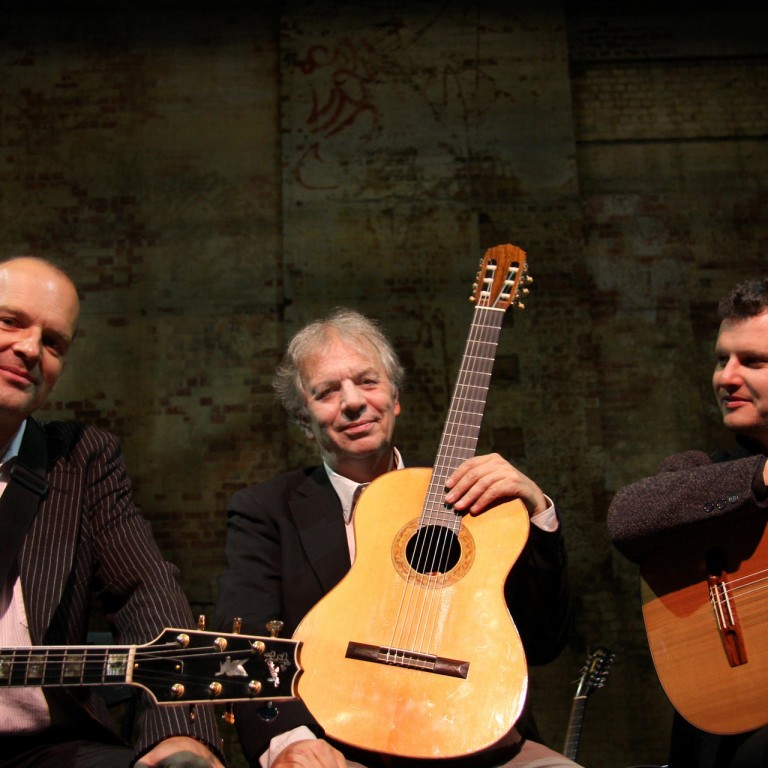
Jazz guitar trio proves three's company
A new album prompts Robin Lynam to reflect on the challenges and rewards of jazz guitar trios
Groups comprising three guitarists are not unheard of in jazz, but they are fairly unusual.
Guitar duos are relatively common, partly because of the ease with which two players can switch back and forth between playing chord parts and single note solos. Trios open up a wider range of harmonic possibilities - but they can be fraught with complications.
Trios require arrangements and some disciplined preparatory work if the players are to avoid getting in one another's way
While two good guitarists can often improvise effectively together with little or no rehearsal, trios require arrangements and some disciplined preparatory work if the players are to avoid getting in one another's way.
There are successful examples. Charlie Byrd, Herb Ellis and Barney Kessel collaborated to critical and popular acclaim as The Great Guitars from the mid-1970s on, with Tal Farlow, Bucky Pizzarelli and Mundell Lowe, among other top players, standing in for Kessel after he became too ill to continue. Of those musicians only Pizzarelli, 88, and Lowe, 91, are still with us.
Following suit in 1979 were John McLaughlin with Paco De Lucia and Larry Coryell, who was replaced by Al Di Meola for the recording in 1980 of , which by jazz standards was a bestseller and often to be heard on the sound systems of wine bars for the rest of that decade.
A studio sequel, , was a better set and also sold well.
The Great Guitars - often assisted by bass and drums - played with the confident swing you would expect of those players. Di Meola, De Lucia and McLaughlin were flashier and played without other instrumental support, but were also notable for a strong rhythmic drive.
The trio of Ralph Towner, Wolfgang Muthspiel and Slava Grigoryan, who have a new album, , are very different, although coincidentally, like the original Great Guitars trio, they were assembled for an Australian tour.
Grigoryan, who turns 38 on Tuesday, was born in 1976 in Kazakhstan, but has lived in Australia since he was five years old. He is recognised as one of the country's foremost classical musicians, but also performs jazz and folk pieces in concert, both solo and in a well-established duo with his fellow guitarist, brother Leonard.
Muthspiel, 48, is Austrian but emigrated in 1986 to the United States where he first made his mark as a member of vibraphonist Gary Burton's Quartet, and later with drummer Paul Motian. A jazz guitarist who doubles as a classical composer, he is also known for performing wordless vocal parts.
The three guitarists get equal billing, but the leader on the basis of seniority is Towner, 73, and it was he who brought the group to the ECM label for which he has recorded for an astonishing 40 years.
Towner was mingling the jazz, folk and classical idioms before Grigoryan was born, both as a solo artist and with Oregon, a group which offered a thoughtful but muscular alternative to the electric and electronic excesses of early 1970s jazz rock fusion.
Ironically, given the direction Weather Report were to go, Towner guested on 12-string guitar on Wayne Shorter's on that band's second album, 1972's .
Towner also plays a classical-style nylon-string guitar, and piano, but it is his 12-string playing which is his most distinctive contribution to modern jazz.
Jazz guitarists who occasionally play 12-string range from Joe Pass to Pat Metheny (who has one guitar with 42 strings, which must be fun to tune) but for most players the 12-string is used either for strummed rhythm or as a novel sound for a melody line or riff.
Twelve strings are not easy to play, and Towner is almost alone in attempting to use his instrument in a more creative musical way. He is alone in improvising on it at the level displayed on this and many of his other recordings.
There are those who will argue the Towner-Muthspiel-Grigoryan album is not really jazz. There are swinging passages, but it is true they are few and far between. The sound of the electric, classical, baritone and 12-string guitars seems at times dangerously close to "new age" muzak, but the compositions and improvisations have a rigour quite alien to that genre.
Technically much of the playing is demanding, but none of it is flashy. The guitarists' mastery of their instruments is employed in the service of the music rather than the expression of their egos, which wasn't always the case with McLaughlin, Di Meola and De Lucia.
Essentially this is modern guitar chamber music, incorporating a high level of jazz improvisation - playing full of subtle nuances which repays repeated listening.
Three significant albums from Towner.
-
(1973): Towner's second album for the ECM label involves no outside help. He plays unaccompanied solo nylon-string and 12-string guitars and pianos, supported only by the occasional overdub which he also performs himself. and are among his most enduring compositions.
-
(1976): the original Oregon line-up augmented by drummer Elvin Jones. For those who find some of the other Oregon albums from the group's 1970s creative heyday insufficiently jazzy, this should hit the spot.
-
(2009): in another unusual instrumental configuration, Towner, on guitars, recorded a duet album comprising mostly his own compositions with Paolo Fresu on trumpet and flugelhorn. Tribute is paid to Miles Davis and Bill Evans with the inclusion of .

